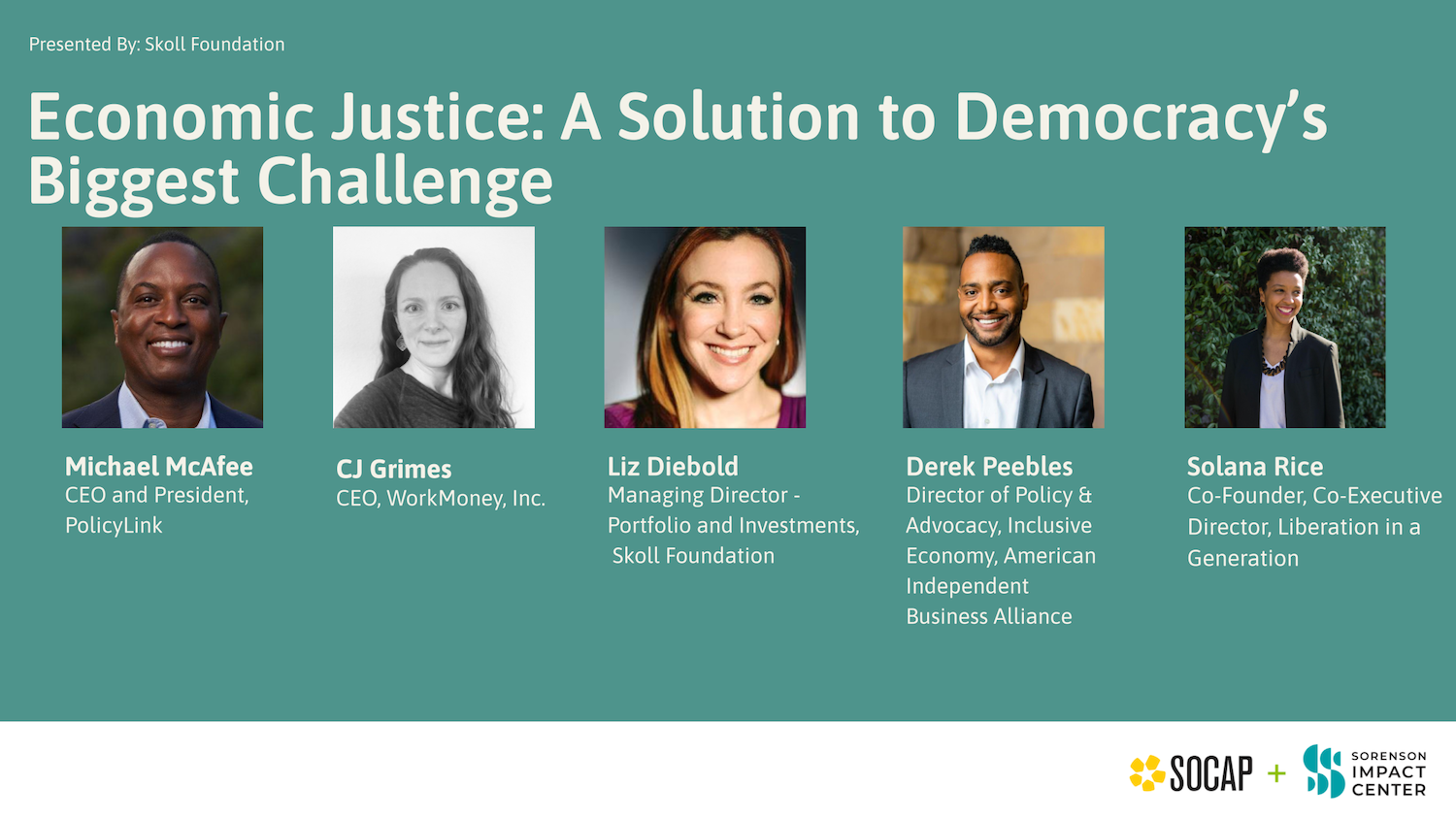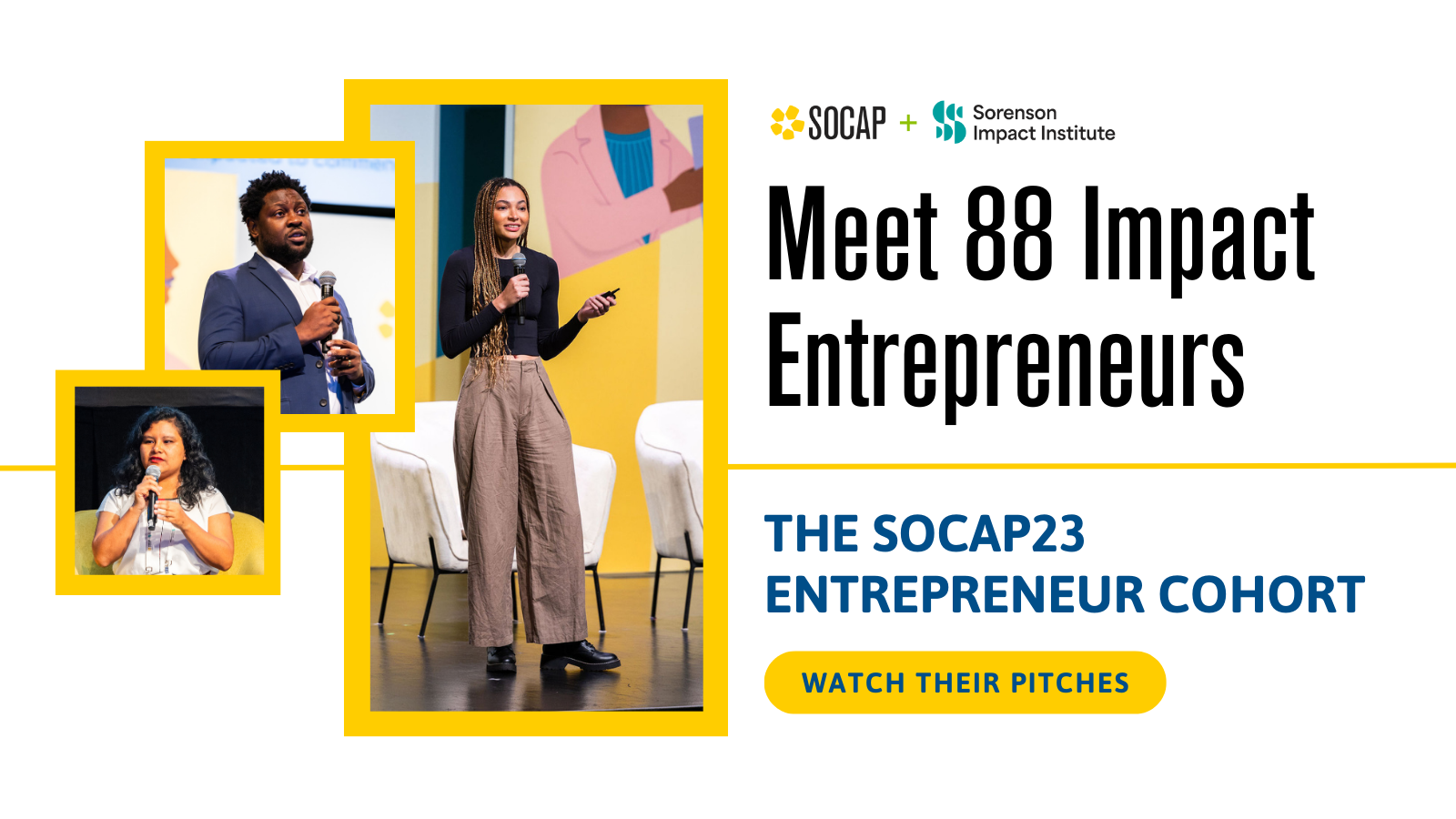Economic Justice: A Solution to Democracy’s Biggest Challenge
“Racism will disappear when it’s no longer profitable, and no longer psychologically useful.”
Author Toni Morrison
Author Toni Morrison noted the United States’ roots as a nation built on racism and an economy powered by slavery in a 2008 interview about her book A Mercy, set in Colonial America. Her written and spoken words still hold relevance in a society where economic justice remains elusive, where the racial wealth gap continues to grow, and the U.S. political system falls short of its promises of equality and representative government.
The connections between economic justice and democracy and the need for collective action to change systems to better serve all Americans came to the fore during the SOCAP22 mainstage session “Economic Justice: A Solution to Democracy’s Biggest Challenge,” which featured leaders and organizations advancing a more inclusive economy and society. Moderator Liz Diebold, Managing Director – Portfolio Investments, Skoll Foundation, launched the discussion by noting that democracy is designed to be a practice that involves ongoing engagement between elected officials and the constituents they serve, while economic justice has the goal of rectifying the fact that talent is equally distributed, but opportunity is not.
Solana Rice, Co-Founder and Co-Executive Director of Liberation in a Generation, cited Morrison’s quote about racism’s role in driving business decisions and behaviors as a driver for her work to advance economic justice. “We need to acknowledge the fact that racism is profitable,” she said. “If we don’t have ways to hold governments accountable for distributing the resources of our talent and capital, then we can never expect racism to not be profitable.”
Creating a functioning democracy that serves all Americans requires a liberation economy where each person’s needs are met, and their contributions to the community are properly valued, she said. “There are a lot of things we need to dismantle; cycles of oppression we need to dismantle,” she said. “The way we approach it is to work with people building power in their communities every day. … When we talk about democracy, we also have to be finding sites of small-d democracy where people can really be practicing.”
As CEO of WorkMoney, Inc., CJ Grimes oversees the organization’s mission to ensure all Americans can afford to lead a good life — something that isn’t the case now. More than 140 million Americans can’t afford a $1,000 emergency, she said, and WorkMoney is pursuing a two-pronged strategy to create a more equitable economy. By pursuing policy change and helping people pay less for everyday items, Grimes said WorkMoney aims to realize the promise of democracy. “It’s supposed to do something: create an America where people can lead better lives,” she said. “That’s not what’s happening for a lot of folks. Their relationship between their experiences and democracy is beginning to fray.”
But it is possible to do things differently, Grimes said. During the COVID-19 pandemic, political leaders provided temporary financial relief to many Americans — child tax credits, economic impact payments, the Paycheck Protection Program, and others — that showed the opportunity for policy change. “People saw that our leaders could make different choices,” she said. “Most folks just want it to be a little bit better.”
Meeting the Moment to Advance Economic Justice
Michael McAfee, CEO and President of PolicyLink, said the organization recently added a goal to realize a strong, accountable democracy as part of its mission to meet the moment and advance economic justice. “Were we going to make a decision on doing well at grant deliverables or really make a difference?” he asked. “There’s nothing wrong with charity, but stop conflating charity with the liberatory acts that are necessary.”
One of those acts is to create a new standard for governing a thriving multi-racial U.S. democracy by building on the Civil Rights Act — passed nearly 60 years ago — and creating new policies that drive change. “My job is to partner with others to usher in a democracy that works for everyone. 100 million people need us to design a just and fair nation in which everyone can prosper and reach their full potential,” McAfee said. “The dream of a just and fair society cannot be realized if we play small. … We have to own the design of the nation. We are its founders.”
Helping small-business owners and entrepreneurs prosper is the goal of the American Independent Business Alliance, which supports more than 250,000 enterprises, said Derek Peebles, Director of Policy & Advocacy – Inclusive Economy. “When we talk about economic justice and democracy, we have a Constitution built and created to protect wealthy landowners. … The powers that be are up in their ivory towers and own everything, and the politics are designed for all of us at the bottom to be fighting amongst each other.”
The alliance works to organize businesses and educate policymakers but also does outreach to investors to connect them with underrepresented entrepreneurs who can play a key role in driving local economic justice and growth, Peebles said. “The one thing our economy needs right now is an economics of compassion. It’s really a reimagining of what our economy could look like if we treated everyone as a person with gifts and assets instead of trying to figure out what’s wrong with them,” he said. “We’re trying to really change the conversation and community narrative around what is a democracy that is thriving and works for everyone.”
Watch Economic Justice: A Solution to Democracy’s Biggest Challenge
Speakers:
Michael McAfee, CEO and President, PolicyLink
CJ Grimes, CEO, WorkMoney, Inc.
Derek Peebles, Director of Policy & Advocacy, Inclusive Economy, American Independent Business Alliance,
Solana Rice, Co-Founder, Co-Executive Director, Liberation in a Generation
Liz Diebold, Managing Director – Portfolio Investments, Skoll Foundation, Moderator






